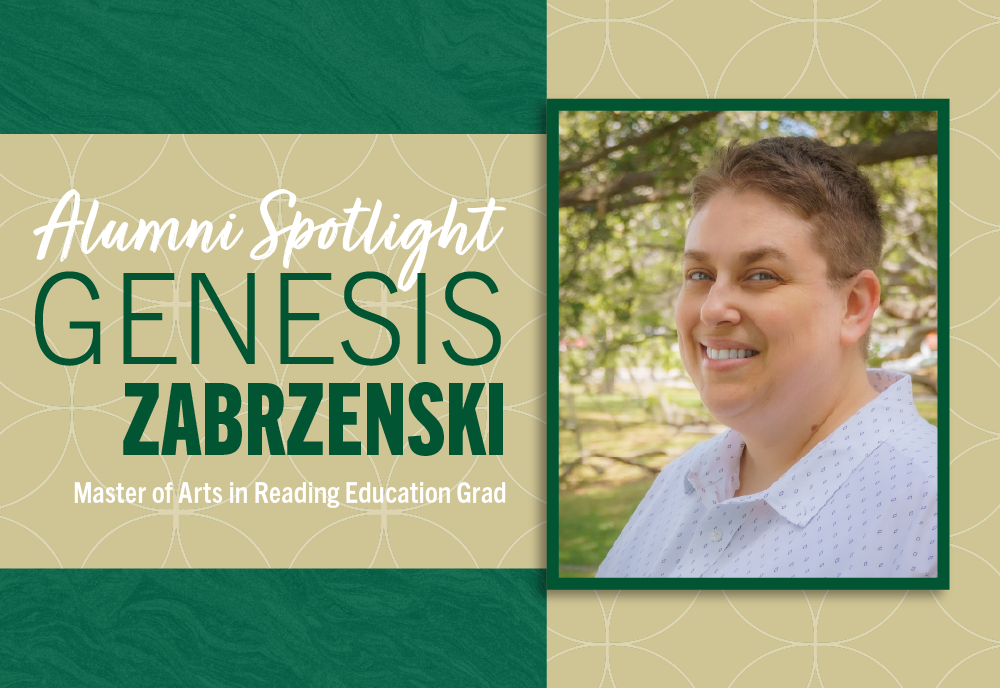Genesis Zabrzenski has worked with students for more than 20 years, but it was one seventh-grade boy — and USF’s Master of Arts in Reading Education — that helped them reconnect with the reason they became a teacher.
The fully online program includes a practicum, which is a hands-on, final course that unifies everything learned in the program. Zabrzenski used the experience to work one-on-one with a student who had scored at the lowest level on the Florida Assessment of Student Thinking (FAST) reading assessment. Though the student had been labeled as a non-English learner, Zabrzenski noticed something didn’t add up.
“This program helped me love teaching again. It brought me back to the values and impact that made me become a teacher in the first place.”— Genesis Zabrzenski, MA in Reading Education Student
“His father only spoke English, and his mother, who spoke Spanish, only spoke English at home,” Zabrzenski said. “He wasn’t passing the reading tests, but when I began working with him, I realized it wasn’t about his reading level or speaking English. It was about background knowledge.”
Using a research-based assessment that controlled for background information, Zabrzenski discovered that the student was reading on grade level when the topic was familiar to him.
“That changed everything,” Zabrzenski said. “He came from a background where he didn’t have exposure to the topics that were being tested. Once we found a book he was interested in, and that he had background knowledge about, everything improved.”
Zabrzenski began modeling reading strategies and coaching the student on how to monitor comprehension. Eventually, he was reading aloud and applying those strategies on his own. By the end of the intervention, he was reading confidently and was not placed in required intensive reading the following year.
The experience brought theory to life and reignited Zabrzenski’s love of education, despite the burnout they and many other teachers feel given the pressures placed on educators.
“This program reminded me why I teach,” they said. “It helped me focus on what matters most: the students, our values, the impact we can make.”
This isn’t That: Becoming a Better Educator
Like many Florida teachers, Zabrzenski entered the profession without a formal education degree. They earned a bachelor’s in psychology from USF and taught in multiple districts, leading everything from AP Psychology to pre-K.
Though many master’s students pursue the degree to meet Florida’s K–12 Reading Endorsement requirements, Zabrzenski already had that certification. For Zabrzenski, the program was about growth, not credentials.
“I’ve taken many district-led PD classes over the years,” Zabrzenski said. “This isn’t that. It’s not about following a script or learning curricula to teach to a test. It’s about thinking critically, understanding research, and becoming a better educator.”
A Personal Experience in an Online Format
Zabrzenski enrolled in the program while married, parenting nearly grown children, teaching full time, and managing depression and anxiety. They needed a program that was rigorous but flexible, one that wouldn’t require stepping away from work or family or other things that they valued, like volunteering with a cat rescue.
USF’s program delivered both the structure and support needed. Zabrzenski said most courses included live weekly sessions in the evenings because most students work as teachers during the day. In the graduate classes, professors encouraged peer engagement and checked in on progress, which was expected.
But what stood out most was the personal connection beyond that.
Instructors offered personal feedback and one-on-one meetings. Many went out of their way to ensure students felt seen and supported.
“They put thought and care into every class. They were available, encouraging, and they made the online format feel incredibly supportive. You aren’t a face on a screen, you’re a student and a participant,” Zabrzenski said.
“They call on you when you try to fade into the background. They reach out. They give you every opportunity to succeed. It doesn’t feel like an online program. It feels like a community.”
Taking the next step
Inspired by that community, Zabrzenski will begin a PhD in literacy after completing the master’s program this summer. The next goal: teaching at the college level and contributing to research on reading instruction, educational policy, and the “why” behind the teacher shortage.
“I want to keep helping students, but on a larger scale,” Zabrzenski said. “Through research, policy, and preparing the next generation of educators.”
And that, they say, is what makes USF’s program different.
“You come out of it with your own voice, your own perspective, and a renewed sense of purpose,” Zabrzenski said. “And that’s something every teacher deserves.”
